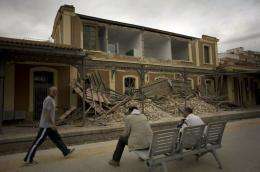Spain takes heavy toll for moderate quake: geologists

Spain suffered an unusually high death toll in a moderate quake that claimed nine lives in the southeastern city of Lorca on Wednesday, geological experts said.
The magnitude-5.1 quake was "foreseeable in its magnitude and its location", in the quake-prone area, said Tena Davila, geologist and spokesman for Spain's College of Geologists.
Some of the victims and structural damage could be explained by the age of the city of 92,000 inhabitants, which traces its history back 2,000 years and boasts medieval and baroque buildings, he said.
If the tremor had struck in a more modern city complying with latest earthquake requirements, the toll would have been considerably lower, Davila said.
Southeastern Spain is seismologically the most active part of the country, Davila said.
But the tremor was 10,000 times weaker than the magnitude 9.0 earthquake and ensuing tsunami that devastated northeast Japan on March 11, killing more than 13,000 people and leaving more than 15,000 missing, he said.
Seismologists estimate there is little risk of such a major quake striking Spain, he said.
"Spain is prepared to deal with the seismic risk that matches its development but it is true that we could do a lot better," the geologist said in an interview.
The president of the College of Geologists, Luis Suarez, said the tremor released energy equal to 200 tonnes of TNT.
A quake of this scale should not be strong enough to bring buildings to the ground, and the scale of the damage must have been due to pre-existing structural problems, Suarez said in a statement.
(c) 2011 AFP



















